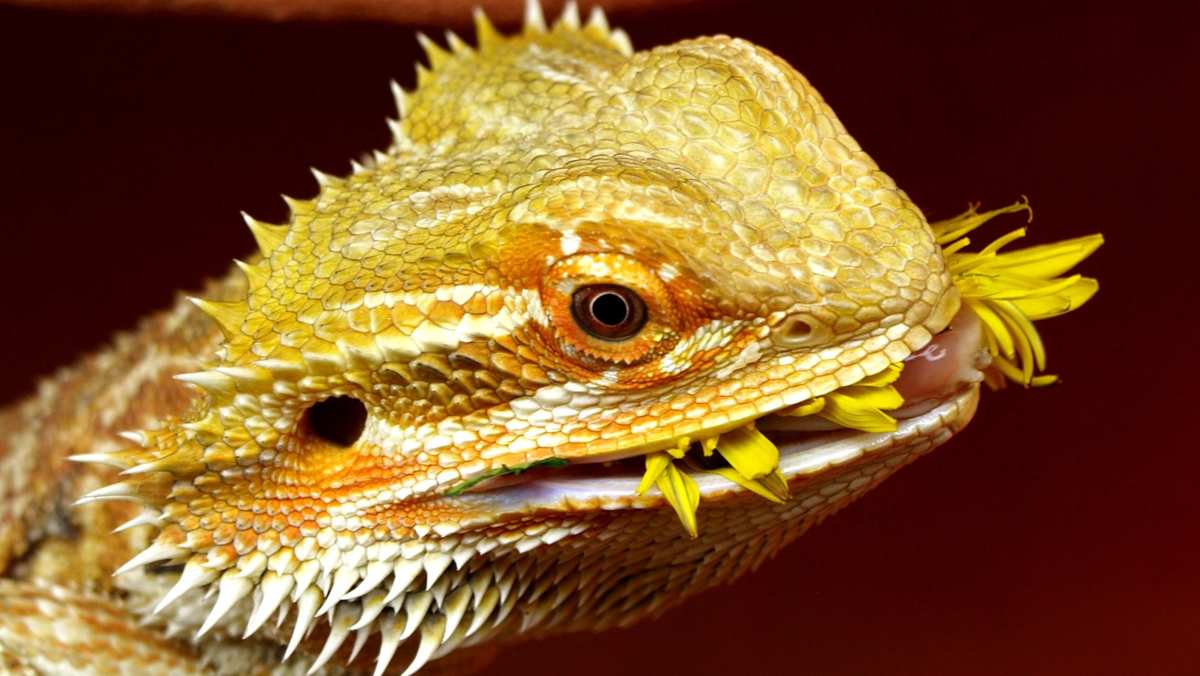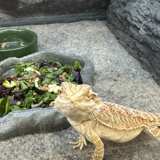
- Good for younger beardies
- Good for adult beardies


A bearded dragon's diet is vital to keeping him or her healthy and active. Feeding bearded dragons can seem complicated, however by following the easy guidelines below you will be able to keep your bearded dragon healthy and happy.
Bearded dragons are omnivores and can eat a variety of things. Normally your bearded dragon's diet will consist of vegetables, insects, and non-citrus fruit. When you give your beardie insects you will need to make sure that the insect isn't too big for your dragon to eat. If it is longer than the space between it's eyes, then it is too large.
When a bearded dragon is young it will need to eat more insects than vegetables because it's still growing. You should always leave fresh vegetables in the cage, but three times per day you should feed your beardie insects. You should give them as many insects as they can eat within a 10-15 minute time period. After the feeding time is done, you should take the remaining insects out of their tank. A typical juvenile bearded dragon can eat anywhere from 20 to 60 crickets (or other insects) each day.
Adult dragons do not need to eat as many insects as younger dragons, and overfeeding your dragon can cause him/her to become overweight. Adults only need to eat insects once per day, so when you feed them, give them as many insects as they can eat within a 10-15 minute time frame and then remove the remaining insects from their tank.
This section will go over what you need to know to feed your bearded dragons insects. Learn what kind of insects to feed your beardie, how to keep your insects healthy, and how to make sure your insects are nutritious.
There are a variety of insects that you can feed your bearded dragon. You never want to feed your dragon insects that you have caught yourself because insects in and around our homes can contain pesticides and parasites that can harm your dragon.
Below are the most common insects fed to beardies, but you can see the full list of safe insects for reptiles here.








Nothing is creepier or more frustrating than realizing the expensive insects you purchased for your beardie have escaped and are roaming around your home. So it is best to take the necessary precautions to make sure this never happens to you.
First off, you need to get a proper storage container for your insects. Many bugs can easily chew and gnaw through most netting and thin plastics so you will need something stronger to contain them. You can purchase 'Critter Keepers' for close to nothing at most pet stores or you can use aquariums or plastic storage bins for insect storage.
Crickets, Roaches, & LocustsIf you're keeping a large number of insects it's probably best to use a large colored plastic storage bin to store them and a small 'Critter Keeper' to transfer them when it's time for feeding. You probably want to avoid using containers which are see-through, because many people have insect phobias and you don't want to risk house guests having a panic attack seeing thousands of crickets, roaches, or worms.
Worms & LarvaeSome worms and larvae can escape the plastic containers they arrive in. It is recommended to use a container with thicker plastic so they cannot chew through the air holes as easily.
Not all feeder insects require the same care instructions, so it's recommended to follow the guidelines from the store/breeder you purchased the insects from. With that being said, there are a few things that apply to all insects.
TemperatureYou will want to store your feeder insects in a location with a steady temperature that is within the range specified for them. Keeping your insects at the right temperature will encourage healthy eating and growth, which are both good for your bearded dragon.
Smell / NoiseInsects (such as crickets) can be noisy and smelly. With this in mind you should store them somewhere you cannot hear or smell them. You can also use various air purifiers which remove (not mask) any smells the insects may create.
It is recommended to make sure the insects you feed to your bearded dragon are healthy and nutritious. The best way to do this is to feed them with a nutritious meal before you feed them (this is also known as 'gut loading'). Most pet stores carry jars of cricket/insect food that both hydrates and feeds the insects. Some owners will also feed their insects with wet lizard pellets.
It is important to never use a water dish to water your insects because they will drown in the bowl. If you're not using cricket food (which hydrates and feeds insects at the same time) you will need to hydrate the feeder insects with raw vegetables, carrots, orange slices, etc.
It may seem boring, but plants are a staple of every bearded dragon's and most other reptile's diet. Keep in mind that many vegetables are full of vitamins and if you are already giving your beardie vitamins you don't want to accidentally poison them with a vitamin overdose. Below is a list of the vegetables that you can feed your dragon:
Many vegetables contain high levels of Vitamin A and while bearded dragons can get vitamin A poisoning, it is generally not caused by overdosing on vegetables. Vegetables contain beta carotene which a bearded dragon's body converts to vitamin A when he/she needs it. If he/she does not need vitamin A then they will simply excrete the beta carotene. So the general rule of thumb is that it is unlikely for a bearded dragon to get vitamin A poisoning from vegetables, simply because the bearded dragon's body can excrete unneeded vitamin A from vegetables.
However, synthetic vitamin A (found in some reptilian multivitamins) cannot be excreted by bearded dragons. This means synthetic vitamin A will cause vitamin A poisoning if the bearded dragon has already had his/her requirements of vitamin A. Moderate to severe vitamin A poisoning occurs when 10,000 IU/kg of synthetic vitamin A is given to a bearded dragon.
The best multivitamin that we have found is Herptivite Multivitamin for Reptiles, because unlike other multivitamins it will not cause vitamin A poisoning. This is because it uses natural vitamin A which cannot poison reptiles, making it extremely healthy and safe for bearded dragons.
Bearded dragons need a diet of both vegetables (greens) and insects. Adult beardies will eat more vegetables than bugs, so its important to make sure the veggies they're eating are healthy and nutritious. You can see the full list of safe vegetables for bearded dragons by clicking here (including their nutritional values), or you can view a partial list below:

You can also feed your bearded dragon a few plants as well. Since they are from the wild the chances are that they didn't always have the option of vegetables so certain plants became a part of their diet. Click here to see the full list of safe plants to feed your bearded dragon, or use the partial list below.
Bearded dragons will also eat fruit. However, not all fruit is easily digested by them (such as citrus fruit), but the following brief list (see the full list here) is safe to feed them.
To keep your bearded dragon healthy you will need to make sure they stay on their diet. There are also some foods which are unhealthy for them or lethal for them to eat. Make sure they do not eat any of the below items:
LettuceSince lettuce is mostly water it is not nutritious for bearded dragons. Because of this it is best to avoid feeding your bearded dragon lettuce or any greens with the word 'lettuce' in the name.
SpinachSpinach is also another food to avoid. While spinach is healthy, calcium binds easily to it which can make it hard for your bearded dragon to digest.
Insects Captured in the WildNever feed your bearded dragon any insects you catch yourself. The insects you catch probably have parasites on them and contain trace amounts of pesticides, both of which can make your bearded dragon sick.
Fireflies or Insects that GlowIf a bug or insect glows in the dark, then do not feed it to your bearded dragon. Glowing insects are incredibly toxic to bearded dragons. Even one of these bugs can be lethal to an adult bearded dragon.
AvocadosDo not feed your bearded dragons avocados. They are toxic, but their toxicity levels are unknown; however, they are deadly for birds.
Below is a limited list of plants and food items that could be poisonous for bearded dragons. This list is from veterinarians which recommend avoid feeding any pets these plants due to their toxicity.
Similar to people, bearded dragons need vitamins and minerals to stay healthy. Below is a list of the supplements that bearded dragons need:
Iron is more important for baby bearded dragons. If you do have a baby bearded dragon and you are giving him/her Iron supplements, be sure to give it to them sporadically because too much Iron can cause bearded dragon health problems. Generally, you can give your bearded dragon enough Iron through vegetables and plants.
Bearded dragons also need vitamin A, but they will usually get enough of this from the plants and vegetables in their diet. You want to be careful not to give your dragon too much vitamin a because that can cause vitamin A toxicity.
As mentioned previously, we highly recommend Herptivite Multivitamin for Reptiles, because it will supply your bearded dragon with vitamin A without the risk of overdosing or making your beardie ill.
Vitamin D3 and Calcium are two of the most important vitamins and minerals you need to make sure your bearded dragon gets. It helps with the development of their bones and is important for female dragons that are gravid (carrying eggs). You will have to give your bearded dragon Vitamin D3 and Calcium at the same time, since bearded dragons cannot absorb calcium without vitamin D3.
In the wild, bearded dragons will get most of the vitamin D3 they need from natural sunlight, so the amount of vitamin D3 you give your bearded dragon depends on how much exposure he/she has to natural sunlight (or full spectrum lighting). If your dragon is frequently outside in the sunlight or if your bearded dragon's cage has full spectrum lighting, then you can reduce the dosage by half.
When choosing a Vitamin D3 and Calcium supplement, make sure the one you purchase has a calcium to phosphorus ratio of 2:1 or 3:1 - the higher the better because you don't want your dragon to have too much phosphorus.
Currently, the highest rated Vitamin D3 and Calcium supplement available is Rep-Cal Reptile Calcium Powder with D3 , which is a favorite among reptile breeders and enthusiasts.
Below are common questions we've been asked about bearded dragon diet and nutrition.
Yes, bearded dragons can eat apples regularly as long as the apple is peeled and cut into the right sizes for them to eat.
Bearded dragons can eat bananas, but you should only feed them bananas rarely. Feeding bananas too often can make your dragon sick.
Yes, bearded dragons can eat blueberries. Just be sure to use fresh washed blueberries (unwashed or frozen blueberries may contain preservatives or pesticides which can make your dragon ill).
Bearded dragons can eat broccoli. However, you should not feed them broccoli too often because it can make him/her ill. Raw broccoli is best, so avoid the temptation to cook it.

Learn how to give your beardie the vitamins and minerals they need to stay healthy.
Go to the Previous Page
See a list of 100 awesome names for bearded dragons.
Go to the Next Page